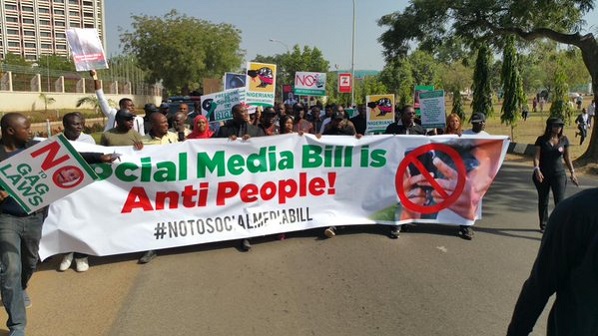BY ADAORA OKOLI
Last week, news broke out, of an ignoble attempt by the Senate to pass a law making it an offence to publish frivolous petitions against a public officer on social media. The bill titled ‘An Act to Prohibit Frivolous Petitions and Other Related Matters scaled second reading on Wednesday, December 2 2015 and seeks to censor social media.
The Bill proposes to criminalize anyone disseminating via text message, Twitter, WhatsApp, or any other form of social media an “abusive statement” intending to “set the public against any person and group of persons, an institution of government or such other bodies established by law.” The penalty for this is up to two years in prison or a N2million fine or both. The bill also makes it an offence for any petition to be submitted without a sworn affidavit from the law court.
While the Senate has denied that intention and the two-year jail term, the wordings of the relevant section of the proposed bill show that online publications and other media are targeted. The senate clearly wants to legislate on defamation, ie damage or serious harm to reputation as a result of false information or publication. In advanced democracies, which hopefully we desire to attain, defamation is never criminalised.
The Senate’s argument is that social media is unregulated. That argument, with due respect, is baseless and holds no water. Globally, the Internet is regulated but it tilts more towards self-regulation because it is a viable tool for information and trade. As it stands today, an offensive or defamatory statement published on Facebook, Twitter, blogs or any social media platform can be reported either to the website operator or the ISP hosting the site and it will be removed after proper investigation. A blogpost of mine, for instance, has been removed after a similar petition over copyright infractions. Issues criminalised under laws on the Internet are usually criminal offences such as terrorism, fraud, child pornography and obscenity. Other issues like trade, intellectual property infringement and defamation are regulated via amendment to existing civil laws or enacting new laws that proffer civil sanctions for any infractions to those civil rights, for instance the US Digital Millennium Copyright Act (DMCA), Communications Decency Act 1996, EU E-commerce Directive 2000 and UK Defamation Act 1996 and 2013. Knowing the sanctity of the freedom of speech and the importance of e-commerce to free trade in a technology-driven world, these laws, while regulating the internet, ensure that the online platforms and persons who provide these services, are not run out of business by unnecessarily restrictive laws that place too much of a burden or liability on them.
Advertisement
By passing this law, the Senate, either wittingly or unwittingly, seeks to strangle freedom of speech where the media and every online publication would be overly censored due to potential criminal sanctions. This would eventually affect e-commerce and e-business in Nigeria, an industry that that is being built, not destroyed, all over the world. A criminal sentence, no matter how little, for a defamatory statement is legally unacceptable. Fines and penalties should be imposed instead either on the person who writes the statement or the online publication or website operator after refusing to take down such a post, despite a well-laid down procedure for notification.
The Senate needs to immediately stop the passage of this bill unless Nigeria, which is still a democratic nation, wants to retrogress and join countries like China and Saudi Arabia that restrict freedom of speech and press freedom, both constitutional rights. If you ask me, we should be copying China and Turkey for all the right reasons, such as innovation and industry, and not anti-people, anti-democratic laws.
Our legislators should also be more interested in passing laws that benefit the people and not self-serving laws that insulate them from the court of public opinion, accountability and transparency. There are myriads of legislation to facilitate e-commerce and trade that a pro-active Senate should instead concern itself with. A cursory look in the direction of the EU, UK and US will give them the right pointers. While it is totally condemnable that anyone would want to intentionally and willfully damage the reputation of another, there are appropriate civil sanctions for that in our defamation laws.
Advertisement
What the Senate should consider is a review of our antiquated and outdated defamation law, which is still in the realm of the common law and is yet to be codified. Even the British that we inherited our laws from have codified and reviewed their defamation law twice to take into cognisance the dynamic nature of technology and the Iinternet, which increasingly witnesses defamation via online platforms like websites and other online intermediaries. Nowhere do any of these laws criminalise defamation. Instead, they actually make liberal provisions to create a healthy balance between defamation and press freedom and also to promote trade and e-commerce.
The Senate should conduct proper research and make public consultations from internet law and policy experts who will advise them on how to draft these laws in accordance with global best practice, one of which is that such a law should be technologically neutral. Unfortunately, what we have seen are legislators who would rather constitute over-bloated committees and pass laws to serve their personal interest, than engage in proper research on laws and policies to give the people a voice and to help our fledgling democracy and economy.
Adaora is a lawyer and journalist and also a post-graduate student in Internet law and policy and ICT law at the University of Strathclyde, UK
Advertisement
1 comments







it will indeed go contrary to principles of freedom of expression